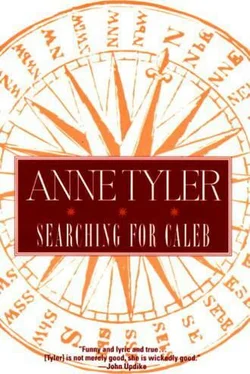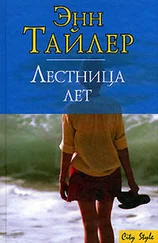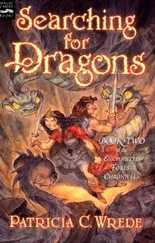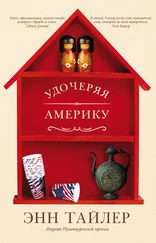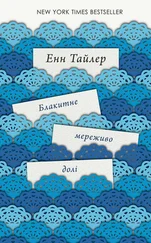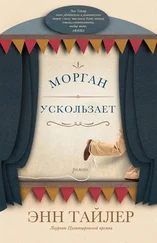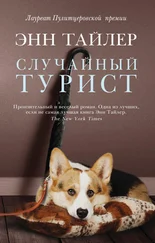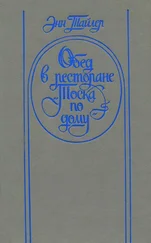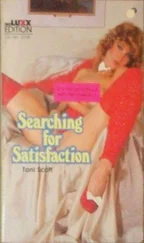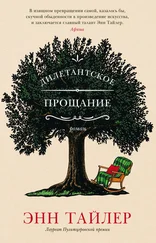By the fall of 1951, Justine had started attending a girls’ junior college nearby. She thought she would do English or preschool education or something. It didn’t much matter. Although she had always been a fair student she didn’t have any real curiosity and she couldn’t think of any career she wanted to aim for. So she and Esther drifted off to college every day in the Ford their grandfather had bought them for commuting, their bright kerchiefs flickering and their hair whipping in the wind. Almost every evening Neely would come over (he was at Hopkins now) to study in the dining room with her. And there were still the Sunday dinners, the cousins alternating with grownups around the table to discourage mischief, and Claude’s round face shining with the relief of being home from the University even if just for a day.
But Duncan!
Something came over Duncan that year. No one could quite put a finger on it. He had what he wanted, didn’t he? He was studying science at Hopkins, wasn’t he? Yet it seemed sometimes that he was more dissatisfied than ever, almost as if he regretted winning. He complained about living at home, which he had to do because Hopkins was so expensive. He said the expense was an excuse; this was just the family’s way of punishing him. Punishing! To live at home with your own close family? He was morose and difficult to talk to. He did not appear to have any friends at all, at least none that he would introduce, and Glorietta was no longer to be seen. Well, of course he had always been somewhat of a problem. Surely this was just another of his stages, the aunts told his mother.
But then he started reading Dostoevsky.
Naturally they had all read Dostoevsky — or at least the uncles had, in college. Or Crime and Punishment , at any rate. At least in the abridged edition. But this was different. Duncan didn’t just read Dostoevsky; he sank in, he buried himself in Dostoevsky, he stopped attending classes entirely and stayed in his room devouring obscure novels and diaries none of the rest of the family had heard of. On a soft spring evening, in the midst of a peaceful discussion on the merits of buying a home freezer, Uncle Two’s branch of the family might be startled by the crash of enormous footsteps down the stairs and Duncan’s wild, wiry figure exploding into the living room to wave a book at them. “Listen! Listen!” and he would read out some passage too loudly and too quickly for them to follow. A jumble of extravagant Russian prose, where emotions were stated outright in a surprising way and a great many extreme adjectives were used and feverish fancies kept darting and flashing. Paragraphs were layered and dense and complicated like chunks of mica. “Did you hear? ” he shouted. His parents nodded and smiled, their embarrassed expressions giving them the look of sleepers dazzled by bright light. “ Well then!” he would say, and off he spun, up the stairs. His parents stared at each other. His father went to talk to the grandfather, who understood it no better. “But I thought he was scientific!” he said. “What is he reading for?” And then, “Ah well, never mind. At least it’s the classics, they surely can’t hurt him.”
But that was before Easter Sunday. On Easter Sunday, at the dinner table, the aunts were discussing Mrs. Norman Worth’s extensive collection of eggshell miniatures. The uncles were arguing the details of a hypothetical legal problem: If a farmer, while turning on the water to irrigate the fields, accidentally startled another farmer’s mule, which, in turn, kicked down the fence enclosing a prize-winning Angus bull, who thereupon . . .
“Neither of these subjects is fit table conversation,” Duncan said.
Everybody thought about that for a minute.
“But what’s wrong with them, dear?” his mother said finally.
“They’re not real.”
Great-Grandma, who had lived longest and was hardest to shock, poured more ice water into her tumbler. “To you they may not be,” she said, “but I myself find eggshell miniatures fascinating and if I didn’t have this tremor I would take them up myself.”
“You owe us an apology, Duncan boy,” said Uncle Two.
“You owe me an apology,” said Duncan. “I’ve spent eighteen years here growing deader and deader, listening to you skate across the surface. Watching you dodge around what matters like painting blue sea around boats, with white spaces left for safety’s sake—”
“ What? ”
“Can’t you say something that means something?” Duncan asked.
“About what?” said his mother.
“I don’t care. Anything. Anything but featherstitch and the statute of limitations. Don’t you want to get to the bottom of things? Talk about whether there’s a God or not.”
“But we already know,” said his mother.
What was so terrible about that? None of them could see it. But Duncan stood up, as wild-eyed as any Russian, and said, “I’m leaving. I’m going for good.”
He slammed out of the dining room. Justine jumped up to follow him, but then she stopped in the doorway, undecided. “ He’ll be back,” Uncle Two said comfortably. “It’s only growing pains. Ten years from now he’ll talk the same as all the rest of us.”
“Go after him,” the grandfather said.
“What, Father?”
“Well, don’t just— somebody go. You go, Justine. Go after him, hurry.”
Justine went. She flew out the front of Great-Grandma’s house and paused, thinking she had already lost him, but then she saw him just coming from Uncle Two’s with a cardboard box. He crossed the lawn and heaved the box into the back seat of the Graham Paige. Then he climbed in himself. “Duncan! Wait!” Justine called.
Surprisingly, he waited. She ran up out of breath, clutching her dinner napkin. “Where are you going?” she asked him.
“I’m moving.”
“You are?”
She looked at the back seat. It was like him to leave his clothes behind and take his box of tools and scrap metal.
“But Duncan,” she said, “what are we going to do without you?”
“You’ll manage.”
“What if we need you for something? Where will we find you?”
By now other members of the family were straggling onto Great-Grandma’s porch. She could tell by the look he flashed over her shoulder. “Bye, Justine,” he said. “I’ve already got a place, beside that bookstore on St. Paul, but don’t tell the others.”
“But Duncan— ”
“Bye, Justine.”
“Bye, Duncan.”
* * *
At first the family assumed he would be home in no time. It was only his age. Everybody eighteen expected deep things of people, but it never lasted . Yet the days stretched on and there was no word of him. They began to question Justine more closely. “He’s all right, he’s got a place to stay,” was what she had said earlier, but now that wasn’t enough. Had he told her where? Because this was not some childhood game any more, surely she was mature enough to realize that. Wasn’t she?
But she had promised Duncan.
Aunt Lucy said Justine was cruel and selfish. Justine’s mother said there was no call for that sort of talk, and then Aunt Lucy broke down and cried. “Now look here. Get a hold of yourself,” the grandfather said, which made her turn on him. Why couldn’t a person let loose a little, after all? Where was the sin? How come a forty-four-year-old woman didn’t have a right to cry in her own house, and state her feelings as she pleased, without a bunch of Pecks crowding around telling her she was not sufficiently dignified, and elegant, and tasteful, and respectable?
“Why, Lucy Hodges!” said Aunt Sarah.
Читать дальше
